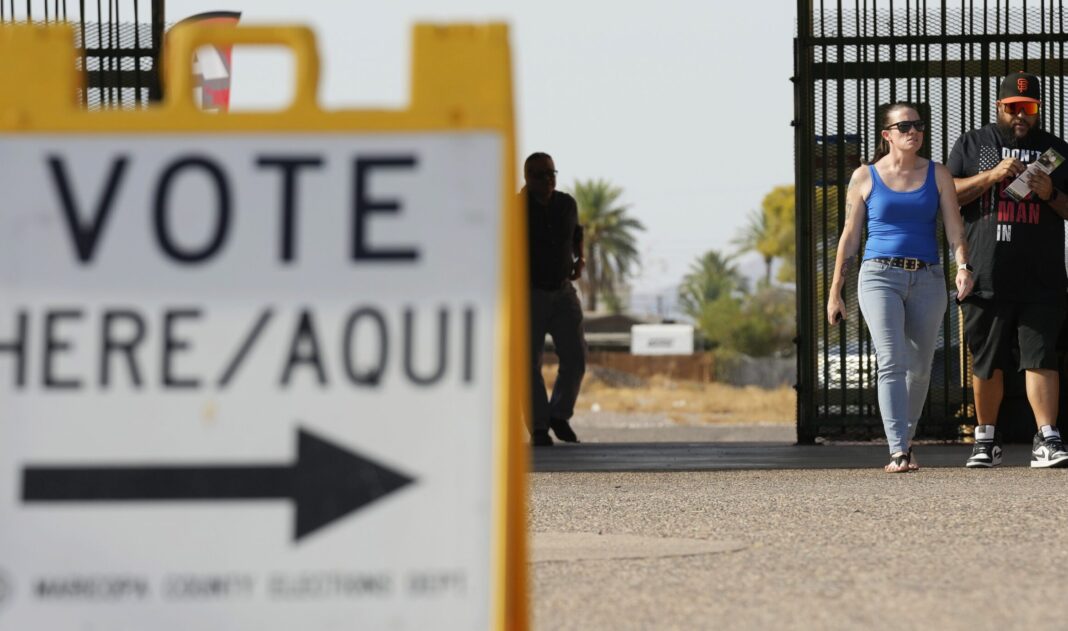BTN News: As the 2024 elections approach, a controversial Spanish-language ad campaign targeting non-citizen voters has sparked outrage. The League of United Latin American Citizens (LULAC), one of the nation’s oldest and most prominent Latino civil rights organizations, has strongly criticized the ad, calling it “alarmist” and “misleading.” The ad, funded by a group linked to Donald Trump’s allies, aims to dissuade non-citizens from voting by warning of legal consequences, including deportation.
The Controversial Ad Campaign Targets Key Latino Voter States
A new Spanish-language ad campaign, funded by the conservative Article III Foundation, has begun airing in states with significant Latino populations, including Arizona, Nevada, and Pennsylvania. With voter registration deadlines approaching and early voting starting, the ad attempts to deter non-citizens from voting in federal elections. While the first half of the ad promotes voting as a patriotic duty, the second half issues a stark warning: it is illegal for non-citizens to vote, and doing so can lead to deportation.
This campaign comes at a crucial time for voter mobilization, especially among Latino voters who could play a decisive role in these battleground states. The ad is scheduled to run across major Spanish-language platforms such as Univision, Fox Deportes, Galavisión, and ESPN Deportes, as well as on Spanish-language radio.
Trump Allies Fuel Controversy Over Non-Citizen Voting
This isn’t the first time Trump allies have pushed claims about non-citizen voting. Donald Trump himself has frequently alleged, without evidence, that immigrants are being allowed into the country to sway elections in favor of the Democrats. His supporters argue that non-citizen voting poses a threat to election integrity, a claim that has been repeatedly debunked by multiple studies.
Despite the Article III Foundation echoing these concerns in their ads, the Brennan Center for Justice reports that instances of non-citizen voting are extremely rare. According to their findings, only 30 votes out of 23.5 million cast in 2016 were potentially linked to non-citizens. This represents a minuscule 0.0001% of total votes, far from any significant influence on election outcomes.
LULAC Slams the Ad as “Alarmist” and Politically Motivated
In a strongly worded statement, Juan Proaño, executive director of LULAC, condemned the ad campaign as a politically motivated attempt to stoke fear and division. “This is nothing more than a tactic to spread fear among immigrant communities and undermine trust in our democracy,” Proaño said. He criticized the effort for contributing to a false narrative about non-citizen voting, pointing out that such cases are extraordinarily rare and have little to no impact on election results.
Proaño also highlighted that Trump’s allies in Congress have taken steps to enshrine these claims in policy, pointing to recent efforts to pass the SAVE Act, which would add provisions targeting non-citizen voting in federal legislation. He argued that this is part of a broader strategy to foster distrust in the electoral system, especially among Latino and immigrant communities.
The Broader Impact on Latino Voter Engagement
LULAC expressed concern that these ads, which target Latino-heavy areas, may deter lawful voters from participating in the election. By conflating immigration issues with voter fraud, the ad campaign risks undermining Latino voter turnout. Proaño urged both political parties to stand against what he called a “campaign of hysteria” designed to intimidate voters and erode democratic participation.
“This is not about protecting election integrity. It’s about discrediting and disenfranchising Latino voters,” Proaño said, reiterating LULAC’s commitment to fighting voter suppression efforts.
What the Facts Say: Non-Citizen Voting Is Incredibly Rare
Research from numerous sources, including the Brennan Center for Justice, consistently shows that cases of non-citizens attempting to vote are exceedingly rare. In addition to the 2016 findings, other studies have similarly failed to identify any widespread instances of non-citizens voting. This raises questions about the true intent behind the ad campaign, which critics argue is designed to exploit fear and misinformation to influence voter behavior.
In response to the ad, LULAC and other civil rights groups are mobilizing to educate Latino voters about their rights and encourage participation in the 2024 election.


